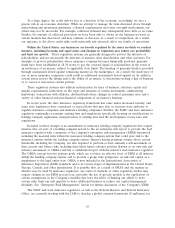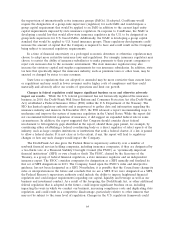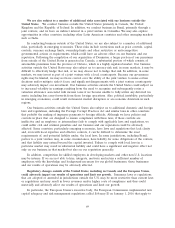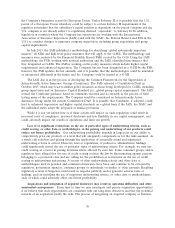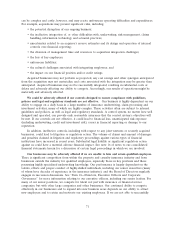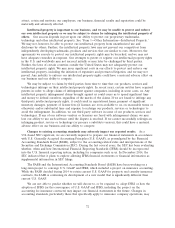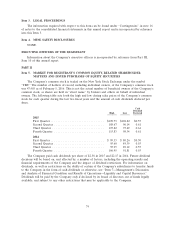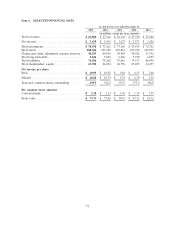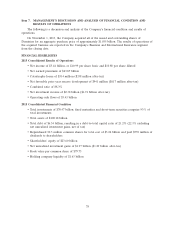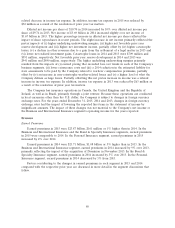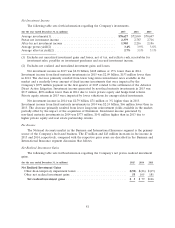Travelers 2015 Annual Report Download - page 72
Download and view the complete annual report
Please find page 72 of the 2015 Travelers annual report below. You can navigate through the pages in the report by either clicking on the pages listed below, or by using the keyword search tool below to find specific information within the annual report.attract, retain and motivate our employees, our business, financial results and reputation could be
materially and adversely affected.
Intellectual property is important to our business, and we may be unable to protect and enforce
our own intellectual property or we may be subject to claims for infringing the intellectual property of
others. Our success depends in part upon our ability to protect our proprietary trademarks,
technology and other intellectual property. See ‘‘Item 1—Other Information—Intellectual Property.’’
We may not, however, be able to protect our intellectual property from unauthorized use and
disclosure by others. Further, the intellectual property laws may not prevent our competitors from
independently developing trademarks, products and services that are similar to ours. Moreover, the
agreements we execute to protect our intellectual property rights may be breached, and we may not
have adequate remedies in response. Our attempts to patent or register our intellectual property rights
in the U.S. and worldwide may not succeed initially or may later be challenged by third parties.
Further, the laws of certain countries outside the United States may not adequately protect our
intellectual property rights. We may incur significant costs in our efforts to protect and enforce our
intellectual property, including the initiation of expensive and protracted litigation, and we may not
prevail. Any inability to enforce our intellectual property rights could have a material adverse effect on
our business and our ability to compete.
We may be subject to claims by third parties from time to time that our products, services and
technologies infringe on their intellectual property rights. In recent years, certain entities have acquired
patents in order to allege claims of infringement against companies, including in some cases, us. Any
intellectual property infringement claims brought against us could cause us to spend significant time
and money to defend ourselves, regardless of the merits of the claims. If we are found to infringe any
third-party intellectual property rights, it could result in reputational harm, payment of significant
monetary damages, payment of license fees (if licenses are even available to us, on reasonable terms or
otherwise) and/or substantial time and expense to redesign our products, services or technologies to
avoid the infringement. In addition, we use third party software in some of our products, services and
technologies. If any of our software vendors or licensors are faced with infringement claims, we may
lose our ability to use such software until the dispute is resolved. If we cannot successfully redesign an
infringing product, service or technology (or procure a substitute version), this could have a material
adverse effect on our business and our ability to compete.
Changes to existing accounting standards may adversely impact our reported results. As a
U.S.-based SEC registrant, we are currently required to prepare our financial statements in accordance
with U.S. Generally Accepted Accounting Principles (U.S. GAAP), as promulgated by the Financial
Accounting Standards Board (FASB), subject to the accounting-related rules and interpretations of the
Securities and Exchange Commission (SEC). During the last several years, the SEC has been evaluating
whether, when and how International Financial Reporting Standards (IFRS) should be incorporated
into the U.S. financial reporting system, including for companies such as us. In December 2014, the
SEC indicated that it plans to explore allowing IFRS financial statements or financial information as
supplemental information in SEC filings.
The FASB and the International Accounting Standards Board (IASB) have been working on a
long-term project to converge U.S. GAAP and IFRS, which included a project on insurance accounting.
While the FASB decided during 2014 to retain current U.S. GAAP for property and casualty insurance
contracts, the IASB is continuing its development of a new model that is significantly different than
current U.S. GAAP.
We are not able to predict whether we will choose to, or be required to, adopt IFRS or how the
adoption of IFRS (or the convergence of U.S. GAAP and IFRS, including the project on the
accounting for insurance contracts) may impact our financial statements in the future. Changes in
accounting standards, particularly those that specifically apply to insurance company operations, may
72



